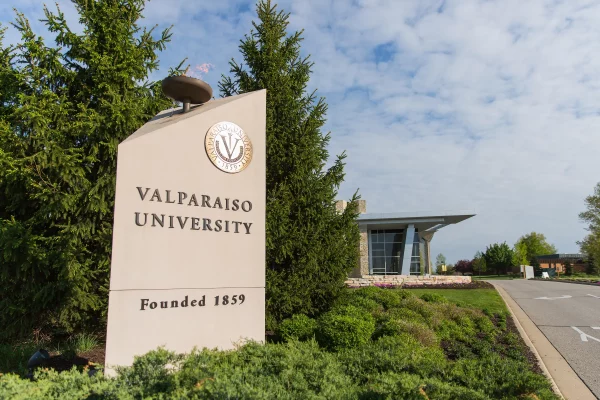Valpo Alumna Receives National Science Foundation Award, Two Alumni Named Honorable Mentions
April 21, 2021 – Valparaiso, Indiana – Valparaiso University alumna Sarah Griffin ’20 has been granted a National Science Foundation (NSF) Graduate Research Fellowship. Elisabeth Noland ’19 and Timothy Mueller ’20 were named honorable mentions for the award.
The Fellowship provides Griffin with a three-year annual stipend of $34,000 along with a cost of education allowance for tuition and fees, in addition to access to opportunities for professional development available to NSF-supported graduate students.
At Valpo, Griffin studied bioengineering with minors in human biology and mechanical engineering. She participated in undergraduate research in the Human Movement Research Laboratory and was involved in Tau Beta Pi, the engineering honor society, and Working Across Vocations Everywhere through Service (WAVES). Griffin is currently in her first year of the doctoral program in bioengineering at the University of Pittsburgh.
“This fellowship is such an honor and I am so grateful that the National Science Foundation sees potential in me as a graduate researcher,” Griffin said. “Additionally, I am very proud of my school and department and I am excited to bring this recognition and value to the work that is being done at the University of Pittsburgh. I am thrilled to join the host of scientists who have received this award previously, and I can’t wait to see what can be accomplished in the coming years.”
At the University of Pittsburgh, Griffin works in the Human Movement and Balance Laboratory under the direction of Kurt Beschorner, Ph.D. They study the biomechanics of human movement, particularly in the context of slips and falls. Griffin is investigating the mechanics of ladder climbing in order to understand what causes people to slip and fall.
With this fellowship, Griffin will be able to add wearable sensors to the study so research can be taken into the field and determine the way people move on a worksite instead of in a lab. One overall goal is to develop novel training methods and recommendations to decrease workplace injury.
“One of the main advantages I have from my degree at Valpo was my ability to be involved in research at a high level from early on in my degree,” Griffin said. “Many schools don’t have the opportunity to pursue research until later years, but I joined a research team at the beginning of my sophomore year and was able to become a relatively independent researcher by the time I graduated.”
Noland studied psychology and Spanish at Valpo and now is in the doctoral program for social psychology at Purdue University. Mueller studied civil engineering at Valpo and is completing a graduate degree in civil engineering at the University of Florida.
Undergraduate research at Valpo prepares students for careers in research and the field after graduation. Students gain valuable experience not frequently extended to undergraduate students.
“Sarah’s achievement in receiving a National Science Foundation Graduate Fellowship is a reflection of her hard work and a testament to the educational foundation she received in the College of Engineering here at Valpo,” said Eric W. Johnson ’87, Ph.D., interim provost and vice president of academic affairs. “Valpo’s commitment to our students and alumni endures well beyond graduation, and we’re proud to see Sarah continue to achieve great success as she furthers her education.”
The National Science Foundation Graduate Research Fellowship Program is the country’s oldest fellowship program that directly supports graduate students in various STEM (science, technology, engineering and mathematics) fields. Since 1952, NSF has funded more than 60,000 Graduate Research Fellowships out of more than 500,000 applicants. Currently, 42 Fellows have gone on to become Nobel laureates, and more than 450 have become members of the National Academy of Sciences. In addition, the Graduate Research Fellowship Program has a high rate of doctorate degree completion, with more than 70% of students completing their doctorates within 11 years.
